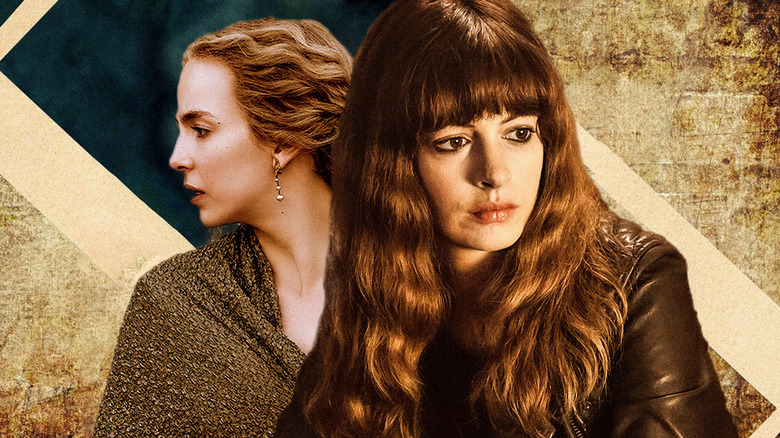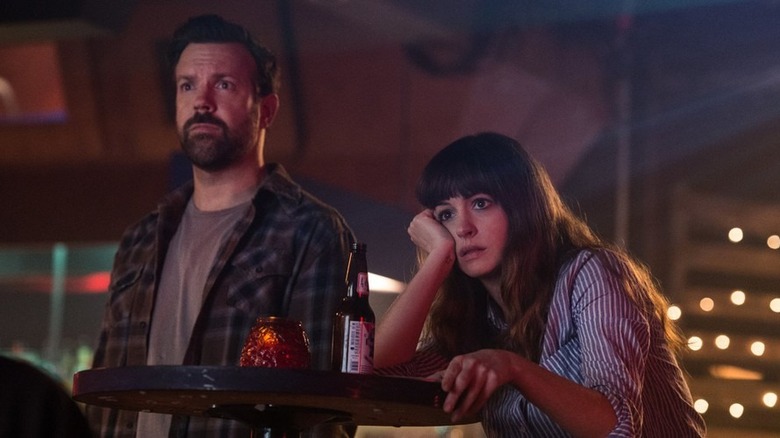The Last Duel And Colossal Are Both Brutal Deconstructions Of The Fragile Male Ego
Grumpy genius grandpa of the cinema space Ridley Scott is rocking a big 2021, with two films — "The Last Duel" and "House of Gucci" — hitting theaters mere months apart. "The Last Duel" flopped at the box office, for which Scott blames Millennials — and if your instinctive reaction is one of anger, remember how much more boring the film world would be if Scott developed a filter in interviews and/or started giving a flying f*** about what Twitter thinks of him. Whether Scott going old-man-yells-at-cloud about the lack of viewership for "The Last Duel," one thing is true, and remains true, as the film approaches home video release on November 30: "The Last Duel" is a damn good film.
More than that, it joins a rarefied canon: 21st Century Films About the Experience of Women that Get It, Actually, Despite Being Directed By Men. See, men? Sometimes you do good. (Though it helps, I must say, to have a script co-written by director Nicole Holofcener.)
Skewed Perspectives
"Rashomon" by way of "Ms. 45," "The Last Duel" tells the story of Marguerite de Carrouges (Jodie Comer), a noblewoman in 14th century France who's raped by a rival (Jacques Le Gris, played by Adam Driver) of her husband (Matt Damon as Jean de Carrouges). After Marguerite persists in pursuing some sort of justice, Jacques and Jean engage in a duel to the death to determine whose side God is on. The story is told in three acts, first from Jean's perspective, then Jacques', then Marguerite's — and by the time you get to her telling, it's pretty clear that the men in the movie are full of sh*t: Jean a self-involved blowhard and Jacques a narcissist with little-to-no self awareness.
"The Last Duel" is full of war, history, dirt, mud, jousting and wimples, and all manner of Period Drama trappings — and yet, as I ruminated on "The Last Duel" after seeing it, one movie kept coming to mind: Nacho Vigalondo's 2016 film "Colossal." You know, the one where Anne Hathaway turns into a kaiju and stomps all over Seoul.
But that's just the elevator pitch. In reality, "Colossal" is a movie about toxic masculinity, in which the layers of the film's antagonist, self-professed Nice Guy Oscar (Jason Sudeikis) are peeled back to reveal someone who's deeply possessive, misogynistic, insecure, and dangerous. The creeping horror of watching "Colossal" comes from the red flags that Oscar plants early in the movie — like gifting Hathaway's Gloria, whom he hasn't seen in years, with a brand new TV as a gift — that are juuuuust innocent-seeming enough to provide him with plausible deniability should anyone call him on being a creep ... an accusation he wouldn't accept anyway, presumably because he's been raised on rom-coms telling us that weirdo, manipulative behavior directed at women is usually some sort of grand romantic gesture.
Oscar, it is revealed throughout the course of the film, has been soaking in self-hatred for years. The issues he probably should have gone to therapy for instead manifest in a hatred for Gloria, whom he resents for her successes. Early in the movie, when they get along — i.e., when Gloria remains within the bounds of what he wants their relationship to be — all is good. When she challenges his perception of what their relationship is, what he is, all hell breaks loose.
Women as Possessions
Jumping forward a few years–and back a few centuries, "The Last Duel" starts with a scene that places Scott's film in the same universe, in regard to gender relations if not kaiju. Following the opening credits, we see Jean leading an army embroiled in a stalemate against the British. He's been ordered to stay where he is to hold an important military location. The British, attempting to rouse him to attack, murder several French women. It's then that Jean (stupidly) marches into battle — after the women are dead, a result borne less of genuine feeling for the women (he did not, for example, try and broker a deal to get them freed) than bruised ego. His enemies have slaughtered French women, his women, and that's an insult that cannot be borne. Women are pawns, tools, items to be possessed and treated well or ill, as befits the masculine hierarchy that surrounds them.
In "Colossal," what pushes Oscar over the edge into full-on, I'm-not-even-pretending douchebaggery is public humiliation at Gloria's hands, when Gloria!Kaiju bitchslaps Oliver!Kaiju and the clip goes viral. What goes on in "The Last Duel" is certainly more, uh, well, more, but it shares a similar spirit — men being deathly afraid of losing face in front of other men and taking their own insecurities out on the women in their lives.
When Marguerite comes to Jean and tells her that Jacques raped her, he's more concerned about how people will perceive him than he is about her, going so far as to demand they have sex immediately after because it would hurt his pride if someone else "had" her more recently. When he insists on a duel to the death, he insists it's to protect her honor, not his ego; even though, if he loses, she will literally be burned alive. More damning — and speaking to the film's complexity, which, given the subject material, seems fair to attribute in large part to co-writer Holofcener — is that, when we see Jean's version of the scene, he comes across as more (not entirely, but more) the concerned husband who genuinely has his wife's best interests at heart. And then there's Jacques, who's convinced that his rape of Marguerite was consensual, who died genuinely not realizing he was anything other than a bit of a cad who has sex with a woman who then turned on him, despite the brutal rape we clearly see through Marguerite's eyes.
Centuries move on, but in "The Last Duel" and "Colossal," men stay the same: emotional, driven by fragile egos, yet so self-obsessed and delusional that they genuinely don't realize how horribly they're treating the women around them. In both films, at least, the women get their happy ending: Gloria defeats Oliver, and Jean kills Jacques in their duel and then ultimately predeceases Marguerite, leaving her to live a happy life sans dudes.


